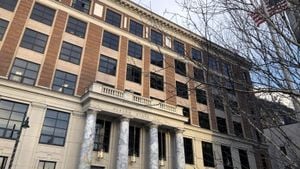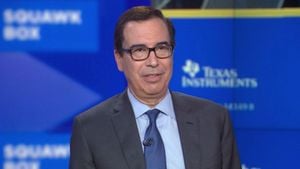Toronto is currently embroiled in heated discussions over the removal of bike lanes, sparked largely by Ontario Premier Doug Ford's new legislative proposals. The government aims to dismantle bike lanes on significant routes, including segments of Bloor Street, Yonge Street, and University Avenue. This move has stirred controversy, raising questions about the impact on commuting times and the financial burden it may place on taxpayers.
According to city staff reports, the province’s plan to remove these bike lanes will cost over $48 million, predominantly due to the required road reconstruction and resurfacing. Despite this substantial estimated expense, officials argue the expected improvement for drivers may be minimal.
Ford's government is aggressively fast-tracking Bill 212, which will shift control from municipalities to the provincial government concerning the approval of bicycle lanes. This has drawn stern criticism from Mayor Olivia Chow, who is also known for her pro-cycling stance. She has emphasized the importance of respecting democratic processes and local governance, stating, "Whether you support bike lanes or you don't support bike lanes, I think it's important ... the people of Toronto have the respect they deserve." Chow has even hinted at the possibility of litigation based on the province's new regulations.
City officials have articulated their concerns surrounding the cost and effectiveness of the bike lane removals. They have cautioned against the anticipated disruption during the construction period, arguing it may worsen travel times rather than alleviate congestion, contradicting the government’s rationale. For Toronto drivers accustomed to the city's notoriously congested roads, the introduction of Bill 212 could mean more frustration.
Provincial representatives contend bike lanes should only be implemented where they are genuinely beneficial, reflecting community needs rather than following blanket policies. They point to existing traffic problems as justification for the potential dismantling of bike lanes, arguing there must be compromise to accommodate both cyclists and drivers.
The debate over bike lanes intertwines with broader discussions about Toronto's urban infrastructure. City staff believe the bike lanes have played a significant role not only in enhancing bike traffic but also in reducing accidents involving cyclists, pedestrians, and vehicle drivers. Studies highlight the safety upgrades made possible through the introduction of dedicated bike lanes, illustrating the lanes' importance to community safety overall.
Adding to the narrative is the city's major public transit woes. Detractors of the Ford administration's proposal are vocal about the underfunding and neglect of public transit—an issue compounded by delays and operational disruptions of the TTC (Toronto Transit Commission). With the TTC moving nearly two million people daily throughout the Greater Toronto Area, many locals feel funding should direct primarily toward improving this service, rather than removing bike lanes.
Proposals for extensive construction projects, such as the controversial tunnel running beneath Highway 401, have also come under scrutiny. Critics argue the province's focus on vehicle-centric infrastructure sets back the progress made toward fostering alternative transportation methods. Professor Shoshanna Saxe, from the University of Toronto’s engineering faculty, noted the estimated timeline and cost for such projects are exorbitant compared to the far cheaper logistics of establishing or enhancing public transportation.
Proponents of bike lanes believe they are key to fostering more active forms of travel and reducing dependency on vehicles—an environmental necessity amid growing concerns over climate change. Statistics reveal bike lanes significantly lead to economic boosts for small businesses due to increased accessibility, alongside enhancing the overall vibrancy of urban areas.
This complex debate encapsulates the tug-of-war between different transportation ideologies—balancing the needs of cyclists versus those of drivers. While some view bike lanes as obstacles hindering vehicular flow, others see them as enablers of sustainable urban living. The challenge remains for city planners and government officials to navigate these opposing perspectives, ensuring the decisions made reflect the diverse population of Toronto without disregarding local voices.
Despite the heated discourse, one thing is clear: the future of Toronto's bike lanes remains uncertain, pending the outcome of provincial legislation and local governmental response. With strong opinions on every side, this issue is set to shape Toronto's urban policy and transportation culture for years to come.



